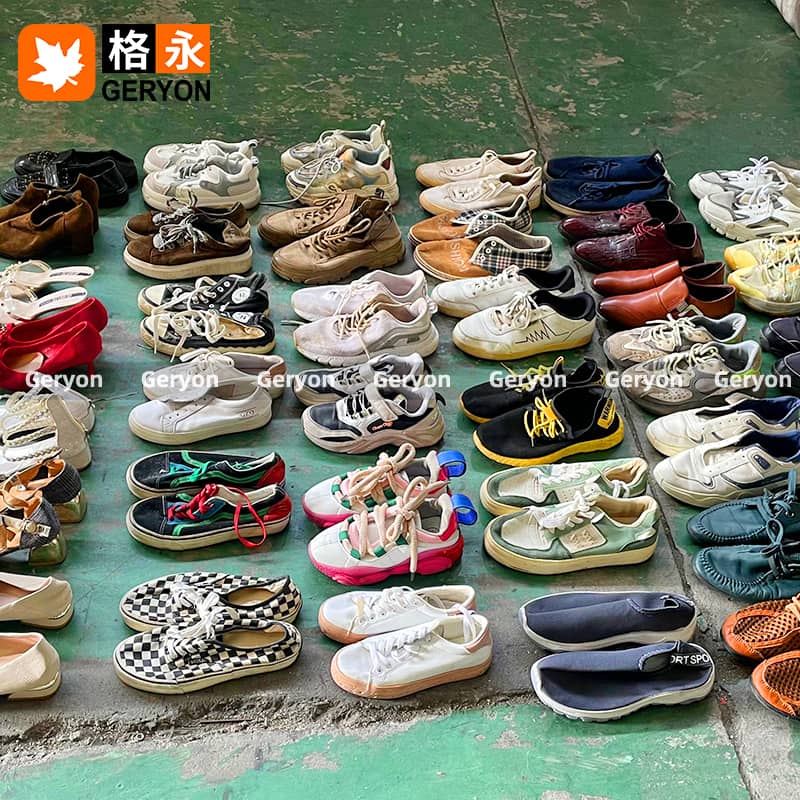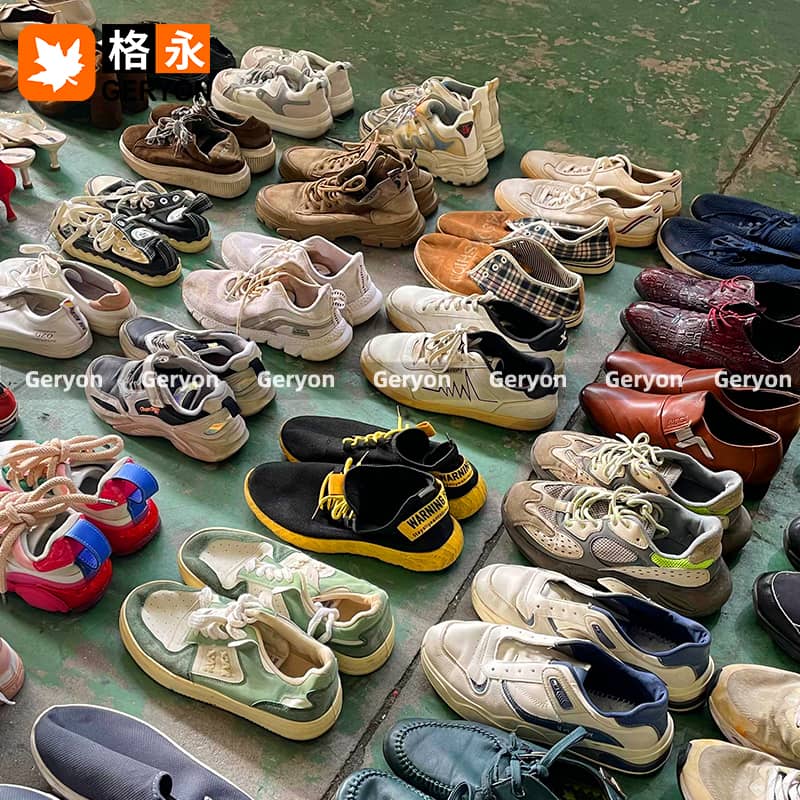The demand for Burkina Faso used shoes has been growing steadily, making it an attractive option for B2B importers seeking quality, cost-effective products to resell. Whether you’re looking to start a new business or diversify your current offerings, understanding the sourcing process is crucial. In this guide, we will explore the key steps involved in sourcing second-hand shoes from Burkina Faso, including how to find reputable suppliers, ensure product quality, and manage logistics for a smooth import process.

Table of Contents
Introduction
Sourcing Burkina Faso used shoes can be a profitable opportunity for B2B importers who are looking to meet the growing demand for affordable and sustainable footwear. In recent years, second-hand shoes from Burkina Faso have gained popularity, both domestically and internationally. This guide provides a step-by-step process to help you source, import, and resell Burkina Faso used shoes, ensuring a successful and profitable business venture.
Why Burkina Faso Used Shoes are a Good Choice for B2B Importers
Burkina Faso used shoes offer a cost-effective option for B2B importers due to their affordability and availability. The second-hand footwear market in Burkina Faso is well-established, offering a diverse range of shoes that are suitable for various consumer needs. Importers can take advantage of the relatively low cost of second-hand shoes, making them an attractive option for resale in markets where budget-friendly products are in high demand. Additionally, the growing global shift toward sustainable fashion makes Burkina Faso used shoes an appealing choice for eco-conscious consumers.
Key Benefits of Importing Used Shoes from Burkina Faso
One of the key benefits of importing Burkina Faso used shoes is the low price point compared to new footwear, allowing importers to offer affordable products to their customers. The demand for second-hand shoes is increasing, particularly in markets where consumers are seeking sustainable alternatives to fast fashion. Importers can also take advantage of the variety of shoes available in Burkina Faso, catering to different styles, sizes, and customer preferences. This diversity offers significant flexibility for businesses aiming to target specific market segments.
Step 1: Understanding the Market for Used Shoes in Burkina Faso
Before sourcing Burkina Faso used shoes, it is essential to understand the local market and consumer demand. This knowledge will help importers make informed decisions when selecting suppliers and determining which types of shoes to import.
Overview of the Used Shoe Industry in Burkina Faso
Burkina Faso has a well-established second-hand shoe market, with a growing number of consumers relying on affordable footwear. This market is driven by local demand, but it also has a strong export component. The country’s second-hand shoe industry is vital to the local economy, providing affordable options for consumers who may not be able to afford new shoes. For B2B importers, Burkina Faso used shoes offer an excellent opportunity to access a diverse selection of footwear at competitive prices, making it an attractive sourcing destination.
Consumer Demand and Trends for Second-Hand Footwear
The demand for Burkina Faso used shoes has been rising in recent years, driven by both local consumers and international markets. More consumers are opting for second-hand shoes due to the growing trend of sustainability and affordability. In Burkina Faso, second-hand shoes are often seen as a more accessible option for consumers, particularly in rural areas where new shoes may be out of financial reach. Understanding these local market dynamics is crucial for importers who want to tailor their offerings to meet the needs of the target audience.
Market Insights for Resellers in Global Markets
The market for Burkina Faso used shoes extends beyond the borders of the country, with many importers seeking to resell these shoes in neighboring countries and international markets. As sustainability continues to be a major global trend, second-hand products, including footwear, are increasingly in demand in various regions. Importers can take advantage of this global trend by sourcing Burkina Faso used shoes, ensuring they meet the growing need for eco-friendly and affordable footwear.
Step 2: Finding Reliable Suppliers of Burkina Faso Used Shoes
Finding reliable suppliers is one of the most important aspects of sourcing Burkina Faso used shoes. Importers should carefully evaluate potential suppliers to ensure they provide high-quality products and reliable service.
How to Identify Trustworthy Suppliers
When sourcing Burkina Faso used shoes, it is essential to work with suppliers who have a proven track record of providing quality products. To identify trustworthy suppliers, importers should research potential partners thoroughly, looking for reviews, testimonials, and any available certifications. Additionally, it’s beneficial to establish direct communication with suppliers to discuss terms, shipping details, and payment methods. Visiting trade fairs and industry events in Burkina Faso can also help establish personal connections with reputable suppliers.
Key Factors to Consider When Choosing Suppliers
There are several key factors to consider when choosing a supplier for Burkina Faso used shoes. First, the quality of the shoes is paramount. Importers should ensure that the supplier offers products that meet both local and international standards. Other factors to consider include the supplier’s reliability, delivery timelines, and pricing. Ensuring that the supplier can meet your business’s needs in terms of product variety, quantity, and consistency is critical to establishing a successful and long-term partnership.
Top Sourcing Platforms and Direct Contacts in Burkina Faso
Several platforms and resources can help importers find reliable suppliers of Burkina Faso used shoes. Online marketplaces, such as Alibaba or local trade platforms, can connect you with suppliers in the country. However, it is crucial to perform due diligence by verifying the credentials and quality of the products offered. Direct contacts with established businesses in Burkina Faso or government trade agencies can also provide valuable connections for sourcing high-quality used shoes.

Step 3: Evaluating the Quality of Burkina Faso Used Shoes
When sourcing Burkina Faso used shoes, ensuring the quality of the products is essential to maintaining customer satisfaction and minimizing returns. Importers must implement effective evaluation methods to assess the condition of the shoes before importing them.
Inspecting Shoe Conditions and Standards
Before committing to a large order, it is important to inspect the condition of Burkina Faso used shoes to ensure they meet your quality standards. Shoes should be free from significant damage, such as large tears, holes, or worn-out soles. It is also crucial to check that the shoes are clean and in good overall condition. Importers can request sample batches to perform quality checks before placing bulk orders. Establishing a clear set of product standards with the supplier is vital to ensure the shoes meet your expectations.
Quality Control Processes to Ensure Customer Satisfaction
To ensure the quality of Burkina Faso used shoes, importers should establish a quality control process. This process could involve inspecting each batch of shoes before shipment or partnering with third-party inspection services to verify product quality. Regular quality checks at various stages of the supply chain will help ensure that the shoes being shipped meet the agreed-upon standards. A robust quality control process will help prevent the importation of subpar products and minimize returns, ultimately improving customer satisfaction.
Tips for Verifying Authenticity and Avoiding Subpar Products
Verifying the authenticity of Burkina Faso used shoes is critical to maintaining the quality and reputation of your business. Importers should be cautious when selecting suppliers to avoid counterfeit or poor-quality footwear. One way to verify authenticity is by checking the source of the shoes and ensuring that the supplier has a reputable track record. Performing a detailed inspection of each shipment and requiring product certifications or documentation can also help avoid subpar products.
Step 4: Importing Burkina Faso Used Shoes
Once a reliable supplier has been identified and the quality of the shoes has been verified, the next step is to manage the logistics of importing Burkina Faso used shoes. Importers need to understand the necessary procedures for shipping, customs clearance, and import duties to ensure a smooth import process.
Step-by-Step Guide to the Import Process
The process of importing Burkina Faso used shoes involves several steps. First, importers need to finalize the order with the supplier, agreeing on the terms of payment, shipping details, and delivery timelines. After the order is shipped, importers must submit the necessary documentation to customs authorities, including invoices, packing lists, and certificates of origin. Working with a reliable freight forwarder can help streamline the process, ensuring that the goods are shipped efficiently and on time.
Understanding Shipping, Customs, and Duties
Importers should familiarize themselves with the shipping options available when importing Burkina Faso used shoes, including air freight and sea freight. Each method has its own advantages, depending on the volume of the order and the urgency of delivery. Additionally, importers need to understand the customs regulations and import duties that apply to second-hand footwear in their country. It’s essential to factor these costs into the overall budget to avoid unexpected expenses.
How to Handle Logistics and Timely Deliveries
To ensure timely deliveries of Burkina Faso used shoes, importers should work with experienced logistics partners who can handle the shipping process efficiently. This includes managing transportation from the supplier’s location to the port, handling customs clearance, and arranging for final delivery to the importer’s warehouse or distribution center. Tracking shipments and staying in regular contact with logistics providers will help ensure that the process runs smoothly and that the shoes arrive on time.

Conclusion
In conclusion, sourcing Burkina Faso used shoes can be a profitable and sustainable business opportunity for B2B importers. By following the steps outlined in this guide, from understanding the market to evaluating quality and managing logistics, importers can successfully navigate the process of sourcing second-hand shoes from Burkina Faso. With the growing global demand for affordable and eco-friendly footwear, Burkina Faso used shoes offer a valuable opportunity to meet this need while building a profitable reselling business.






